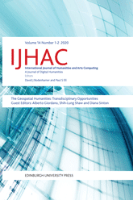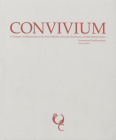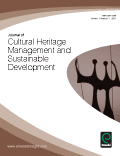
International Journal of Humanities and Arts Computing-A Journal of Digital Humanities
metrics 2024
Bridging the Gap Between Artistry and Technology
Introduction
International Journal of Humanities and Arts Computing - A Journal of Digital Humanities, published by Edinburgh University Press, is a pivotal platform that explores the intricate interplay between the humanities, arts, and digital technologies. With an ISSN of 1753-8548 and an E-ISSN of 1755-1706, this journal serves as a valuable resource for scholars investigating how digital tools transform humanistic research and artistic expression. Since its inception in 1996, the journal has evolved significantly, now positioned within the third and fourth quartiles in various categories including Arts and Humanities, Computer Science, and Human-Computer Interaction as of 2023. This demonstrates its growing relevance and impact in the digital humanities landscape. Although currently not an open-access journal, it offers a diverse range of studies that seek to enhance our understanding of digital methodologies and their implications in human culture, making it an essential read for researchers, professionals, and students alike interested in the synergy of technology and the humanities.
Metrics 2024
 0.16
0.16 0.50
0.50 0.50
0.50 14
14Metrics History
Rank 2024
Scopus
JCI (Web Of Science)
Quartile History
Similar Journals

Convivium-Exchanges and Interactions in the Arts of Medieval Europe Byzantium and the Mediterranean
Illuminating the Intersections of Medieval Art and CultureConvivium - Exchanges and Interactions in the Arts of Medieval Europe Byzantium and the Mediterranean, published by Masarykova University, is a dedicated platform for scholarly discourse in the fields of Classics, History, and the Visual Arts and Performing Arts. Since its inception in 2017, this journal has aimed to enrich our understanding of the intricate cultural interconnections between medieval Europe, Byzantium, and the Mediterranean region, standing as an important resource for researchers, professionals, and students alike. While the journal is published in an open-access format, enabling wider dissemination of knowledge, it currently holds a respectable Q3 quartile ranking across its categories in 2023, reflecting its increasing reputation in the academic community. Although the journal is based in Belgium, its scholarly reach is truly international, as evidenced by its varied contributions. Engage with Convivium to explore the rich tapestry of medieval art and thought, and contribute to the ongoing dialogue about our shared cultural heritage.

Journal of Cultural Heritage Management and Sustainable Development
Transforming cultural heritage through sustainable practices.Journal of Cultural Heritage Management and Sustainable Development is a pioneering publication dedicated to advancing the fields of cultural heritage management and sustainable practices. Published by Emerald Group Publishing Ltd in the United Kingdom, this journal has established itself as a critical resource since its inception in 2011, with an ongoing commitment to quality research through 2024. The journal is notably recognized with a Q1 ranking in Conservation and boasts impressive Scopus rankings, highlighting its significant impact in the realm of arts and humanities. It also showcases a multidisciplinary approach, bridging gaps between business management and urban studies, thereby providing invaluable insights to researchers, professionals, and students. With diverse access options to engage a broad audience, the Journal of Cultural Heritage Management and Sustainable Development thrives at the intersection of scholarship and practical application, making it an essential read for those dedicated to fostering sustainable development in cultural heritage contexts.

Humanities & Social Sciences Communications
Fostering innovation at the intersection of humanities and social sciences.Humanities & Social Sciences Communications is a premier journal published by SPRINGERNATURE, based in the vibrant academic environment of the United Kingdom. Launched as an Open Access publication in 2020, it provides a dynamic platform for interdisciplinary research across the fields of arts and humanities, business, management, economics, psychology, and social sciences. With a distinguished impact factor reflected in its 2023 categorization as Q1 across multiple subjects, this journal exemplifies excellence, holding high rankings in Scopus for general art, economics, and social sciences categories, placing it in the top tiers of research outputs worldwide. The journal aims to foster scholarly dialogue, encourage innovative ideas, and advance significant findings that address the complexities of contemporary societal issues. With open access options, it ensures that research is widely disseminated, promoting global collaboration and engagement among researchers, professionals, and students alike. By merging analytical rigor with real-world relevance, Humanities & Social Sciences Communications stands as a cornerstone resource for anyone seeking to make an impact in their respective fields.

Tekst Kniga Knigoizdanie-Text Book Publishing
Innovating Research for Tomorrow's Publishers.Tekst Kniga Knigoizdanie-Text Book Publishing, an academic journal published by TOMSK STATE UNIVERSITY, focuses on the diverse and multidisciplinary fields of communication, library and information sciences, and media technology. Established in the Russian Federation, this journal serves as a vital platform for sharing innovative research from 2018 to 2024. Though registered under multiple categories, it notably ranks in the lower quartiles of its respective fields, including a Q2 position in Visual Arts and Performing Arts. The journal, with an ISSN of 2306-2061 and E-ISSN 2311-3774, aims to advance knowledge and foster dialogue in these critical areas, making it essential for researchers, professionals, and students seeking to delve deeper into the evolving landscapes of communication and media. Despite currently not being an open access journal, the insights presented within its pages contribute significantly to contemporary discussions and practices. With its commitment to academic rigor, Tekst Kniga Knigoizdanie is poised to impact its communities and beyond.

Tirant
Fostering innovative discourse in the arts and humanities.Tirant, published by Universitat de València, Faculty of Philology, is an esteemed open access journal dedicated to the interdisciplinary exploration of History and Literature and Literary Theory. Since its inception, the journal has aimed to provide a platform for scholarly discourse and dissemination of innovative research, contributing vital insights into cultural and historical contexts. With an impact factor that reflects its status within the academic community, it currently ranks in the Q4 quartile across both areas of study, a testament to its ongoing commitment to fostering research that challenges traditional narratives. The journal, open access since 2008, not only emphasizes the importance of accessibility in academia but also actively engages with broader scholarly communications on a global scale. Nested in the vibrant city of Valencia, Tirant invites emerging scholars as well as established researchers to submit and disseminate their work, creating a rich tapestry of knowledge that intersects literature, history, and critical theory, thus enriching the landscape of the arts and humanities.

Manuscript Studies-A Journal of the Schoenberg Institute for Manuscript Studies
Exploring the Depths of Manuscript PreservationManuscript Studies: A Journal of the Schoenberg Institute for Manuscript Studies, published by University of Pennsylvania Press, serves as a pivotal resource in the intertwined fields of conservation, library sciences, and literature. With an ISSN of 2381-5329 and an E-ISSN of 2380-1190, the journal has been actively contributing to academic discourse since its inception in 2016 and continues to resonate through 2024. The journal is categorized in the Q3 quartiles for Conservation and Library and Information Sciences, and Q2 for Literature and Literary Theory, reflecting its relevance and credibility within these disciplines. While it is not an open-access journal, its vital scholarship is crucial for researchers and professionals dedicated to the preservation and interpretation of manuscripts. Positioned within the competitive arenas of Scopus rankings, Manuscript Studies highlights significant contributions to the understanding of manuscript collections, offering interdisciplinary perspectives that are essential for students and scholars alike. Whether delving into the complexities of textual transmission or exploring methodologies in manuscript conservation, Manuscript Studies remains an invaluable platform for advancing knowledge and fostering dialogue in the study of manuscripts.

Anales de Documentacion
Cultivating Insight and Discovery in Library StudiesAnales de Documentacion is a distinguished open-access journal published by UNIV MURCIA, contributing significantly to the field of Library and Information Sciences since its inception in 1998. With a focus on the dissemination of innovative research and studies, this journal serves as a vital resource for researchers, professionals, and students engaged in the dynamic landscape of documentation and information management. Although coverage in Scopus was discontinued from 2013 to 2020, the journal continues to hold its place in the academic community, ranking #167 out of 227 in the Social Sciences category, reflecting its commitment to quality and relevance. The journal's accessibility enhances its utility, making vital research available to a broad audience, thereby fostering collaboration and scholarly exchange in the evolving discourse of information sciences. Its address at the Edificio Pleiades on the Campus de Espinardo in Murcia, Spain, further signifies its role as a central hub for academic inquiry and exploration in this essential field.

Open Library of Humanities
Bridging Disciplines to Enrich Human ExperienceThe Open Library of Humanities, a premier platform established in 2015 and based in the United Kingdom, elevates the discourse in the fields of Anthropology, Arts and Humanities, Cultural Studies, and Sociology and Political Science. Published by OPEN LIBRARY OF HUMANITIES, this open access journal provides a prominently accessible space for scholars and researchers to disseminate their findings and contribute to a diverse range of academic conversations. With an impressive Scopus ranking that reflects its influence—ranking in the 87th percentile in General Arts and Humanities and in the 80th percentile for Cultural Studies—the journal is recognized for publishing high-quality research that addresses significant and contemporary issues within its scope. By embracing a multidisciplinary approach, the Open Library of Humanities fosters interdisciplinary dialogue and encourages innovative research dissemination practices. Scholars, students, and practitioners are invited to engage with the latest developments and theoretical insights that enrich our understanding of the human experience.

Pixel-Bit- Revista de Medios y Educacion
Transforming Education with Cutting-Edge Media InsightsPixel-Bit: Revista de Medios y Educación is an esteemed academic journal published by UNIV SEVILLA, EDITORIAL, dedicated to advancing the fields of media and education through rigorous research and insightful analysis. With its Open Access policy established in 2010, the journal ensures that the latest findings and methodologies are readily accessible to researchers, professionals, and students worldwide. Operating from Seville, Spain, Pixel-Bit has been recognized for its significant impact within its respective fields, achieving Q2 and Q3 rankings in multiple categories such as Computer Networks and Communications, Computer Science Applications, Education, and Information Systems as of 2023. Its Scopus rankings further reflect its influence, with notable placements in the 83rd percentile in Social Sciences - Education. This journal serves as a pivotal platform for disseminating knowledge, fostering innovative practices, and bridging the gap between technology and pedagogy in an increasingly digital world.

Zivot Umjetnosti
Exploring the vibrant intersections of visual and performing arts.Zivot Umjetnosti, published by the INST POVIJEST UMJETNOSTI - INST ART HISTORY, is a notable Croatian journal that serves as a platform for scholarly discourse in the fields of visual arts, performing arts, and museology. With its inception in 2008, the journal has continued to provide a voice for researchers and practitioners alike, contributing significantly to ongoing conversations in the arts. Despite its current Q4 rank in both Visual Arts and Museology categories—placing it within the 21st and 17th percentiles, respectively—Zivot Umjetnosti is recognized for its commitment to advancing knowledge and fostering critical dialogue. The journal aims to bridge theoretical frameworks with practical applications, making it an invaluable resource for academics, curators, and students engaged in artistic research. While currently operating under traditional access options, Zivot Umjetnosti remains a fundamental publication for those wishing to explore and expand their understanding of the dynamic intersection of art and culture in Croatia and beyond.